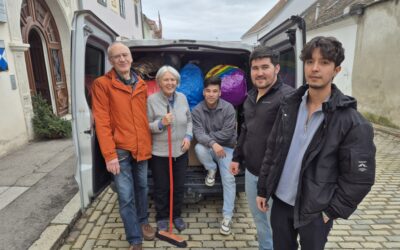During the last supper, before leaving his friends and returning to the Father, Jesus wants to unite them closely to himself and among themselves with the most solid and lasting bond: love. He “loved them to the end” (Jn 13:1), with the greatest love, that is, “to lay down one’s life” (Jn 15:13). In return, he asks to be loved with the same love.
The love that Jesus asks for is not simply a feeling; it is doing his will as it is described in his commandments; above all, it is loving our brothers and sisters, and achieving reciprocal love. It is such an important truth for Jesus that in this last discourse to his disciples he forcefully repeats it three more times: “Whoever has my commandments and observes them is the one who loves me” (Jn 14:21); “Whoever loves me will keep my word” (Jn 14:23); “Whoever does not love me does not keep my words” (Jn 14:24).
«If you love me, you will keep my commandments»
Why must we keep his commandments?
Since we human beings are created in his “image and likeness,” we stand before God as his “you,” capable of a direct, personal relationship with him, a relationship of knowledge, of love, of friendship and of communion.
I “am” to the degree that I say “yes” to the plan of love that God has for me.
The relationship with him is essential to human nature. The more it is actively pursued, deepened and enriched, the more men and women fully develop their true personalities.
Look at Abraham. Each time God asks him to do something, even when it seems to be absolutely absurd, like leaving his country to go off to an unknown land or like sacrificing his only son, he immediately holds fast to his trust in God, and a future he could never have imagined opens up for him.
The same is true for Moses. On Mount Sinai the Lord reveals his will to him in the Ten Commandments and the adherence to them gives birth to the people of God.
It is true for Jesus as well. His “yes” to the Father is the most complete: “Not my will but yours be done” (Lk 22:42).
To follow Jesus means to carry out the Father’s will in the best way possible, as Jesus taught us and as he was the first to do.
The commandments that Jesus left us help us to live according to our nature as sons and daughters of a God who is Love. They are not, therefore, arbitrary impositions or an artificial superstructure – much less something to alienate us. Nor are they like the commands that a master gives to his servants. Rather, they are the expression of his love and of his concern for the life of each one of us.
«If you love me, you will keep my commandments»
How can we live this Word of Life?
Let’s try to listen attentively to what Jesus tells us in the Gospel – his commandments – and let’s allow the Holy Spirit, throughout the day, to remind us of his words. He teaches us, for example, that it is not enough not to kill; we must avoid being angry with our brothers and sisters. We not only cannot commit adultery, but cannot even desire the wife of others. “If anyone strikes you on the right cheek, turn the other also” (Mt 5:39). “Love your enemies and pray for those who persecute you” (Mt 5:44).
Above all, let’s live what Jesus called “his” commandment, the one that sums up all the others: mutual love. “Love is the fulfillment of the law“ (Rm 13:10); it is the “more excellent way” (1 Cor 12:31), the way we are called to follow.
Someone who understood this very well was Father Dario Porta, a priest from Parma, Italy, who died on Holy Thursday, 1996. Even though he had a close relationship with God from the early years of his priesthood, he grew to understand ever more clearly that he needed to see Jesus in every neighbor, and then evangelical love became his passion. To remain faithful to this commitment, he tried to be more and more attentive to others, putting aside his own plans, to the point of writing in his diary one day: “Now I see that in the end the only thing we would like to have accomplished is to have loved every neighbor1.”
We can do the same: each night we can ask ourselves, “Did I always love every neighbor today?”
Chiara Lubich
1) Dario Porta,Testimone dell’Amore gratuito, a cura di Piero Viola, Parma 1996, p. 33.




0 Comments